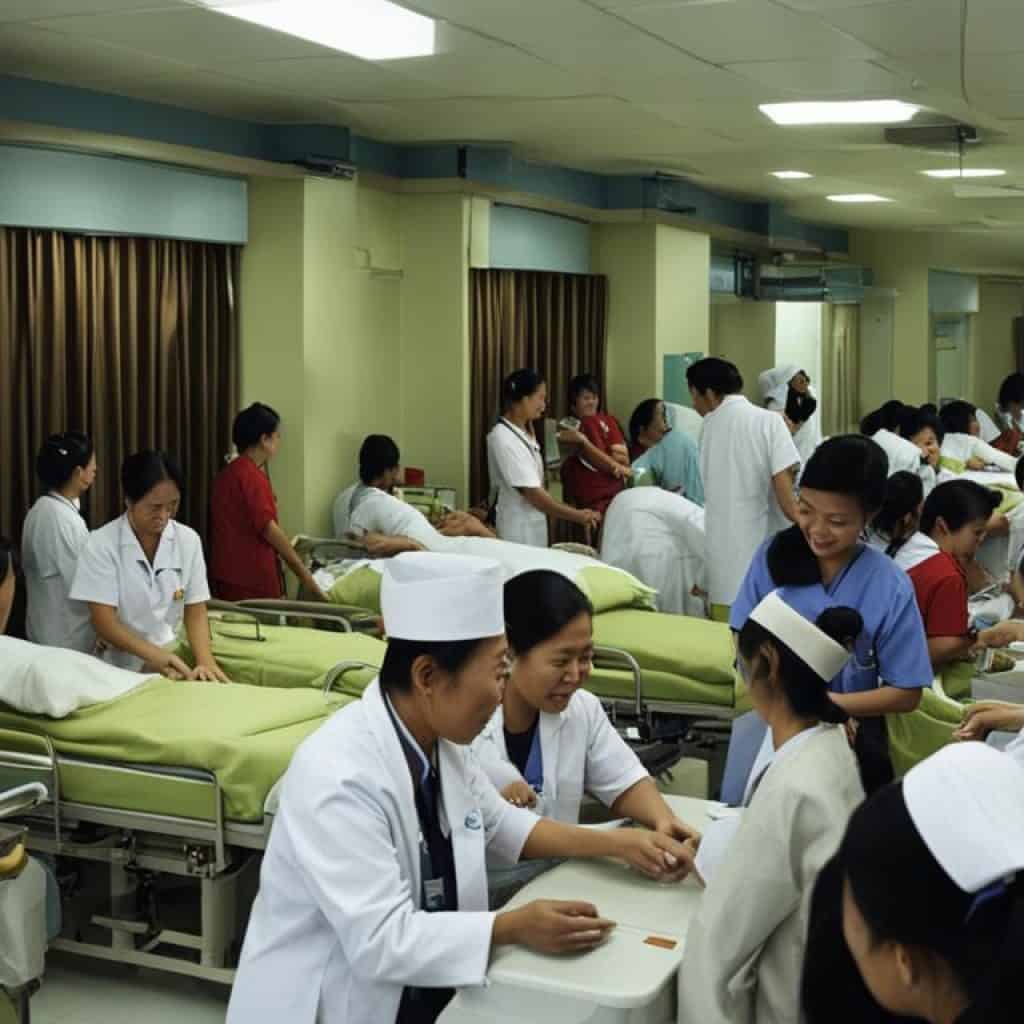When it comes to finding the perfect place to call home, the Philippines is often overlooked. But is this underrated country a hidden gem for expats seeking a new adventure? From the tropical weather and stunning beaches to the low cost of living and friendly locals, the Philippines has a lot to offer. However, it also comes with its own set of challenges and considerations. So, is the Philippines a good place to live? Let’s dive in and explore the pros and cons of living in this vibrant Southeast Asian nation.
Key Takeaways:
- The Philippines offers a unique expat experience with its tropical weather and beautiful beaches.
- The low cost of living in the Philippines is a major draw for many expats.
- Crowded cities, high crime rates, and the potential for natural disasters are important factors to consider.
- The healthcare system in the Philippines provides both public and private options for expats.
- English is widely spoken in the Philippines, making communication easier for expats.
Pros: Affordable Cost of Living
One of the major advantages of living in the Philippines is its affordable cost of living. Compared to Western countries, the expenses for accommodation, groceries, and dining out are generally more budget-friendly. For example, you can find a cozy 1-bedroom apartment in Manila for as low as $500 USD per month.
When it comes to groceries, basic essentials like bread, eggs, milk, and chicken breast are considerably cheaper than in the US. This allows you to stretch your budget and save money on day-to-day expenses. Additionally, dining out in the Philippines is a delightful experience that won’t break the bank. Whether you choose to indulge in mouthwatering street food from colorful stalls or enjoy a meal at a mid-range restaurant, you can expect the overall dining costs to be relatively inexpensive.
Living in the Philippines provides you with the opportunity to enjoy a comfortable lifestyle without straining your finances. With the affordable cost of living, you can allocate your funds towards exploring the country’s abundant natural attractions, indulging in unique experiences, and building a fulfilling life in the heart of Southeast Asia.
| Expense | Cost in the Philippines | Cost in the US |
|---|---|---|
| 1-Bedroom Apartment in Manila | $500 USD per month | $1,200+ USD per month |
| Basic Groceries (bread, eggs, milk, chicken breast) | Cheaper than in the US | Higher prices in the US |
| Dining Out | Relatively inexpensive | Higher prices |
Note: The costs provided in the table are approximate and can vary depending on location and lifestyle choices.
Cons: Crowded Cities
While the Philippines offers many attractions and advantages, one downside is the crowded cities. Manila, in particular, stands out as the most populous city in the country. The rapid urbanization and increasing population density bring along challenges such as traffic congestion, noise pollution, and crowded public transportation. Navigating through the streets during peak hours can be a daunting task as the bustling streets become packed with vehicles and pedestrians.
One of the main consequences of crowded cities is the issue of traffic congestion. The roads in major cities like Manila often suffer from heavy traffic, causing delays and making commutes longer than expected. This can be frustrating for residents and expats alike, especially if they have time-sensitive commitments.
Image:
Furthermore, the public transportation system in crowded cities can also be overwhelming. Buses, jeepneys, and trains tend to be packed, making the daily commute uncomfortable for many. Expats and locals alike may find themselves squeezed into overcrowded vehicles, especially during rush hours. This can be particularly challenging for those who are not accustomed to such crowded conditions.
Living in crowded cities may not be everyone’s preference, but it’s worth noting that there are less crowded areas in the Philippines. Choosing to live in more rural regions or smaller towns can provide a more peaceful and less crowded environment while still allowing access to urban amenities and attractions.
Pros: Accessible Healthcare
Expats in the Philippines have access to both public and private healthcare options. The government-owned PhilHealth provides public healthcare coverage for expats working in the Philippines, while self-employed individuals can register as members of the informal economy for coverage. Private healthcare costs tend to be cheaper than in the US, with consultation fees and hospital room rates being relatively affordable.
Public Healthcare: PhilHealth
PhilHealth is a government-owned corporation that provides healthcare coverage for individuals working in the Philippines. Expats employed by companies in the Philippines are automatically enrolled and contribute to PhilHealth through deductions from their salaries. PhilHealth coverage includes inpatient and outpatient services, as well as access to a network of healthcare providers.
| Coverage | Benefits |
|---|---|
| Inpatient Services | Coverage for hospitalization expenses, including room and board, laboratory tests, medications, and surgeries. |
| Outpatient Services | Partial coverage for outpatient consultations, laboratory tests, and medications. |
| Maternity Benefits | Coverage for prenatal and postnatal care, as well as delivery expenses. |
Private Healthcare
Private healthcare in the Philippines offers a range of healthcare facilities, including hospitals, clinics, and specialty centers. While private healthcare services come at a cost, they tend to be more affordable than in the US. Consultation fees for specialists, such as doctors and dentists, are generally lower, making healthcare more accessible to expats.
| Private Healthcare Services | Costs |
|---|---|
| Doctor Consultation | Average cost of $20-30 USD per visit. |
| Hospital Room Rates | Average cost of $50-100 USD per day, depending on the facility and location. |
| Diagnostic Tests | Reasonably priced compared to other countries. |

With both public and private healthcare options available, expats in the Philippines can access quality medical services at relatively affordable costs. Whether using the government-provided PhilHealth or opting for private healthcare, expats can rest assured knowing that healthcare in the Philippines is accessible and comprehensive.
Cons: Expensive Electricity
While the cost of living in the Philippines is generally affordable, expats should be aware that electricity costs can be relatively high. When budgeting for utility expenses in a 1-bedroom apartment, it is advisable to allocate around $80-100 USD per month for electricity bills.
It’s important to note that electricity bills often tend to increase during the hot months of April and May. This is primarily due to the high demand for air conditioning to combat the tropical heat and maintain comfort.
When planning your monthly budget, it’s essential to consider the fluctuating electricity costs in the Philippines to avoid any financial surprises. By factoring in these expenses, you can ensure that your finances remain in check and that you are well-prepared for utility bills.
Pros: Diverse & Cheap Public Transportation
One of the advantages of living in the Philippines is the diverse and affordable public transportation system. From buses to trains and the iconic jeepneys, getting around the country is convenient and budget-friendly.
The Philippines offers a wide range of public transportation options to suit different needs and preferences. Whether you’re traveling within the city or exploring the countryside, you’ll find a mode of transport that suits your requirements.
One of the most popular and iconic forms of public transportation in the Philippines is the jeepney. These colorful and uniquely designed vehicles can be seen all over the country, providing an authentic local experience. Jeepney rides are not only affordable but also a great way to immerse yourself in Filipino culture.
For those looking for a more modern and convenient option, the Grab app is widely used in the Philippines. Grab is a ride-hailing service that allows users to book a car or taxi with just a few taps on their smartphones. It offers a safe and reliable transportation alternative, especially for city dwellers.
“Public transportation in the Philippines is diverse and affordable, providing residents and tourists with various options to travel conveniently and within their budget.”
| Pros of Public Transportation in the Philippines | Cons of Public Transportation in the Philippines |
|---|---|
|
|
Cons: Driving Is Not for the Faint-Hearted
Driving in the Philippines can be quite a challenge. With traffic congestion, disregard for traffic rules, and reckless driving, it’s not for the faint-hearted. Whether you’re navigating the streets of Manila or venturing into the provincial areas, you’ll encounter traffic jams, especially during peak hours. Defensive driving skills are essential to ensure your safety on the roads.
One of the major issues with driving in the Philippines is the heavy traffic. The country’s urban centers experience significant congestion, particularly during rush hours. This can lead to long and frustrating delays. Patience is crucial, and it’s advisable to plan your journeys accordingly, giving yourself extra time to reach your destination.
Another challenge you may face is the lack of adherence to traffic rules. Some drivers exhibit a disregard for basic road regulations, making it important for you to stay alert and anticipate the actions of others. Defensive driving techniques, such as maintaining a safe distance and being prepared for sudden lane changes or turns, can help you avoid accidents.
Reckless driving is also a concern on Philippine roads. Some drivers engage in aggressive behaviors, such as excessive speeding or tailgating. It’s crucial to prioritize your safety and that of your passengers by remaining cautious, following speed limits, and avoiding unnecessary risks.

Considering the challenges of driving in the Philippines, it’s worth exploring alternative modes of transportation, especially in highly congested areas. Public transportation options include buses, trains, and the iconic jeepneys. These modes of transport may be more convenient, cost-effective, and less stressful than driving.
Driving in the Philippines can be an adventure of its own, and it requires a certain level of resilience and adaptability. By being aware of the traffic conditions, following road rules, and driving defensively, you can navigate the roads safely. However, if you’re not comfortable with the chaotic and unpredictable nature of driving in the Philippines, exploring public transportation or hiring local drivers can be viable alternatives.
Pros: Wonderful Sense of Community
Filipinos are known for their warm and friendly nature, making expats feel welcomed and part of the community. Community living is an integral part of Filipino culture, with locals often coming together to help one another and treat their elderly community members with respect. Building relationships and making friends in the Philippines is often a rewarding experience.
Cons: High Crime Rates
While the Philippines offers a vibrant and enticing expat experience, it’s important to acknowledge the challenges in terms of safety and security. The country experiences relatively high crime rates, including gang activity, scams, and pickpocketing. This can be a concern for expats who prioritize personal safety.
However, it doesn’t mean that safety in the Philippines is unattainable. By adopting a proactive approach and taking necessary precautions, expats can mitigate the risks and enjoy their time in the country.
Taking Steps for Personal Safety
When it comes to personal safety, it’s essential to be cautious and aware of your surroundings. Here are some preventive measures:
- Avoid carrying large amounts of cash: Minimizing cash exposure can reduce the risk of theft. Utilize cashless payment methods whenever possible.
- Stay vigilant in crowded areas: Public places with high foot traffic, such as popular tourist spots and markets, can be potential targets for pickpocketing. Maintain awareness of your belongings and be cautious of strangers.
- Secure housing options: Choose accommodations with proper security measures, like gated communities, 24/7 security personnel, CCTV cameras, and secure entrances.
- Be aware of common scams: Stay informed about common scams prevalent in the area and learn how to identify and avoid them. This includes scams related to tourism, transportation, and financial transactions.
By implementing these safety measures, expats can better navigate their daily lives and reduce the chances of falling victim to crimes.
Crime Prevention Initiatives
The Philippine government and local authorities are continuously working towards improving safety and crime prevention in the country. They have implemented various initiatives to address and reduce crime rates, including:
- Increasing police visibility and patrols in high-crime areas.
- Enhancing community-based crime prevention programs.
- Strengthening cooperation between law enforcement agencies and the community.
These efforts aim to create a safer environment for both locals and expats alike.
Summary
While the Philippines has higher crime rates compared to some other countries, personal safety can still be achieved by taking necessary precautions and being aware of your surroundings. By staying vigilant, choosing secure accommodations, and staying updated on common scams, expats can navigate the beautiful landscapes and vibrant culture the Philippines has to offer while minimizing potential risks.
Pros: English Is Widely Spoken
One major advantage of living in the Philippines as an expat is the widespread use of the English language. English is an official language of the Philippines alongside Filipino, allowing for seamless communication and integration into the local community. Filipinos, especially those in urban areas, possess a good command of English, making it easier for expats to navigate daily life and connect with locals.
Whether you’re ordering food, asking for directions, or engaging in business transactions, you’ll find that many official documents, signs, and services are available in English. This linguistic advantage greatly eases the transition for expats, making it simpler to settle into the vibrant Filipino culture.
While English is the language of instruction in schools and universities, learning some basic Filipino phrases can be greatly appreciated by the locals and create a deeper cultural connection. Embracing the local language can enhance your overall experience by fostering stronger relationships and understanding the rich heritage of the Philippines.
English Proficiency Statistics in the Philippines
| Year | English Proficiency Index (EPI) |
|---|---|
| 2021 | 63.03 (High proficiency) |
| 2020 | 64.57 (High proficiency) |
| 2019 | 63.69 (High proficiency) |
“English proficiency has been a notable strength of the Filipino population, with consistently high scores in the English Proficiency Index. This linguistic advantage not only facilitates communication for expats but also attracts global companies looking for a talented English-speaking workforce.”
Overall, the prevalence of English as a communicative language in the Philippines significantly contributes to the convenience and comfort of expat life. From navigating transportation to engaging with the community, the widespread use of English empowers expats to build meaningful connections and fully immerse themselves in the vibrant Filipino culture.

Cons: Terrorism Threats
While the Philippines offers a captivating expat experience, it is important to address the safety concerns that come with living in the country. Terrorism threats in the Philippines pose a potential risk to residents and tourists alike. Occasional attacks have been known to occur in various parts of the country, particularly in high-traffic areas like shopping malls and transport hubs.
Staying informed about the current security situation is crucial for expats. It is recommended to regularly follow travel advisories issued by your home country and local authorities. By doing so, you can stay updated on any potential threats or safety warnings in the areas you plan to visit or reside in.
Exercise caution and be vigilant in areas with a high risk of terrorist activity. Avoid crowded places that could be potential targets. Additionally, it is advisable to maintain situational awareness and report any suspicious activities to the local authorities.
“The safety and well-being of our citizens abroad is our top priority. We strongly encourage all expats in the Philippines to stay informed and take necessary precautions to ensure their personal safety.” – [Insert Name], [Insert Title]
Travel Advisory: United States Department of State
“Exercise increased caution in the Philippines due to crime, terrorism, civil unrest, a measles outbreak, and kidnapping. Some areas have increased risk. Read the entire Travel Advisory.”
| Terrorism Threat Level | Description |
|---|---|
| High | Areas with a known presence of terrorist groups and a history of attacks |
| Medium | Areas with a potential risk of terrorist activity |
| Low | Areas with a minimal or no known terrorist threat |
It is crucial to stay informed about the terrorism threat level in your area of residence or travel. The table below provides an overview of the terrorism threat levels in the Philippines.
While the Philippines faces terrorism threats, it is important to note that millions of expats enjoy their time in the country without any safety issues. By staying informed and taking necessary precautions, you can mitigate the risks associated with terrorism and ensure a safe and fulfilling expat experience in the Philippines.
Pros: Abundant Natural Attractions
The Philippines is a paradise for nature enthusiasts, offering a plethora of breathtaking natural attractions that will leave you in awe. From pristine beaches to lush rainforests and mesmerizing waterfalls, this archipelago is a treasure trove of outdoor wonders.
One of the top attractions in the Philippines is swimming with whale sharks. These gentle giants can be found in the waters of Donsol, Oslob, and Bohol, providing an unforgettable experience for those seeking an up-close encounter with these magnificent creatures.
Whether you’re an adrenaline junkie seeking thrilling outdoor activities or someone who simply wants to bask in the beauty of nature, the Philippines has something for everyone. Its natural attractions are sure to leave a lasting impression and create unforgettable memories.
Conclusion
Living in the Philippines offers a unique expat experience with its affordable cost of living, beautiful natural attractions, and friendly locals. Expats can enjoy a laid-back lifestyle surrounded by tropical weather and stunning beaches, all at a relatively low cost.
However, it’s important to consider the drawbacks when deciding to live in the Philippines. Crowded cities, especially Manila, can lead to traffic congestion and noise pollution. High crime rates are a concern, and expats should take precautions to ensure their safety. Additionally, the country is prone to natural disasters, so being prepared is crucial.
Ultimately, the decision to live in the Philippines depends on individual preferences and priorities. For those seeking adventure, natural beauty, and a warm sense of community, the Philippines can be an excellent choice. Despite the challenges, many expats find the benefits outweigh the drawbacks and embrace the vibrant and diverse culture.
FAQ
Is the cost of living affordable in the Philippines?
Yes, the cost of living in the Philippines is relatively low compared to Western countries. Accommodation, groceries, and dining out are generally more affordable.
Are the cities in the Philippines crowded?
Yes, the cities in the Philippines, especially Manila, are densely populated. This can lead to traffic congestion, noise pollution, and crowded public transportation.
What healthcare options are available in the Philippines?
Expats in the Philippines have access to both public and private healthcare options. The government-owned PhilHealth provides public healthcare coverage, while private healthcare costs tend to be affordable.
Are electricity costs expensive in the Philippines?
While many things in the Philippines are affordable, electricity costs can be relatively high. Expats should budget for utility expenses, especially during the hot months when air conditioning use is necessary.
What public transportation options are available in the Philippines?
The Philippines offers a variety of public transportation options, including buses, trains, and jeepneys. Jeepney rides are affordable, and the Grab e-hailing app provides a convenient alternative to taxis.
Is driving in the Philippines challenging?
Yes, driving in the Philippines can be challenging due to traffic congestion, disregard for traffic rules, and reckless driving. Expats should consider alternative modes of transportation and be prepared for delays.
Are Filipinos friendly and welcoming to expats?
Yes, Filipinos are known for their warm and friendly nature. Expats often feel welcomed and part of the community in the Philippines, where building relationships and making friends is a rewarding experience.
Are there safety concerns for expats in the Philippines?
Yes, the Philippines has relatively high crime rates, and expats should be cautious and take precautions for personal safety. Choosing secure housing options and staying aware of common scams is important.
Is English widely spoken in the Philippines?
Yes, English is widely spoken in the Philippines, making it easier for expats to communicate and navigate daily life. Most locals have a good command of English, and many official transactions are conducted in English.
Are there terrorism threats in the Philippines?
The Philippines faces occasional terrorism threats, and expats should stay informed and exercise caution, especially in high-traffic areas. Following travel advisories and staying aware of the current security situation is important.
What natural attractions can expats enjoy in the Philippines?
The Philippines is known for its stunning natural landscapes and abundant wildlife. Expats have the opportunity to enjoy activities such as swimming with whale sharks, exploring underground rivers, scuba diving, trekking through rainforests, and island hopping.
Is the Philippines a good place to live overall?
Living in the Philippines has its pros and cons, and the decision ultimately depends on individual preferences and priorities. It offers a unique expat experience with its affordable cost of living, beautiful natural attractions, and friendly locals.


















Add comment